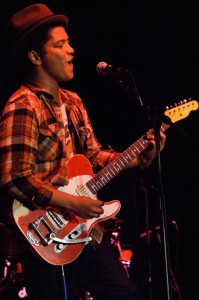Black Student Assembly to utilize budget differently
The Black Student Assembly has announced plans to scale back its annual music and fashion show, Gearfest, because of a shift in programming interests.
Last year, Gearfest featured Bruno Mars and cost approximately $30,000, according to BSA President Eric Burse. BSA had only budgeted $15,000 for the event and had to rely on USG spring allocations and Program Board cosponsors to make up the difference.

Music · Bruno Mars performed at USC’s Gearfest 2010, Sex in Public, Eva Marcille Pigford of America’s Next Top Model hosted the event. - Daily Trojan file photo
Burse said Gearfest has been one of the organization’s larger events in previous years, but BSA has been working to increase year-long programming, instead of focusing on single events.
“We’ve been getting more people involved, expanding our leadership and creating new committees to get people involved,” Burse said. “There are more opportunities, more people coming out and more people becoming active.”
This year Burse said BSA will host Gearfest, which will be held April 15, within the budget USG offered so BSA could provide more funding for other events. Burse said the details for the event have not been finalized.
BSA requested $25,000 for Gearfest this spring, but only received $13,952.15 from the USG spring allocations budget.
BSA applied for an additional $2,000 dollars from USG, but did not receive the funds, by a vote of eight to four.
“BSA has previously asked us for large sums for this particular event and an additional $2,000 might not be able to achieve that level of making this event significantly better,” said Howard Fu, a commuter senator who voted against the funds.
Burse said BSA has already initiated a large alumni mailing, hoping to bring in donations, and raised between $3,000 and $4,000 in additional funding for the event.
“It’s the last big event of the year,” Burse said. “We’d like to make it as good as we can.”
The money BSA saved by not going all-out for Gearfest this year has been used to sponsor monthly performances at Ground Zero, increase BSA’s programming during Parents’ Weekend and host a monthly Distinguished Speaker Series featuring both celebrities and professors.
Ryan Cole, a black freshman majoring in political science, said these events have made him more comfortable at USC.
“It makes me feel more welcomed, like people have an interest in you,” Cole said. “I feel more comfortable at USC and it’s really helped my transition into college. The events also aren’t limited to black students, and help people of other races experience what black culture is and what it means.”
BSA has also been doing more off-campus activities such as monthly meetings with other black student groups from Los Angeles universities, including Loyola Marymount University and UCLA, where they coordinate programming and discuss solutions to problems such as low retention rates of black students at universities and racism on campuses.
Kenyatta McLean, president of the UCLA Afrikan Student Union, said she’s glad USC enabled multiple collegiate groups to address larger issues for black students in higher education because the UCLA Afrikan Student Union does not have the budget to host the events on its own.
“I really commend USC for bringing [these meetings] together, because sometimes we can get caught up in the rivalry of our different campuses,” McLean said. “For us, it’s not really something we could have afforded to do. Because there are such low access numbers for black people coming to college, we really need to support each other.”
